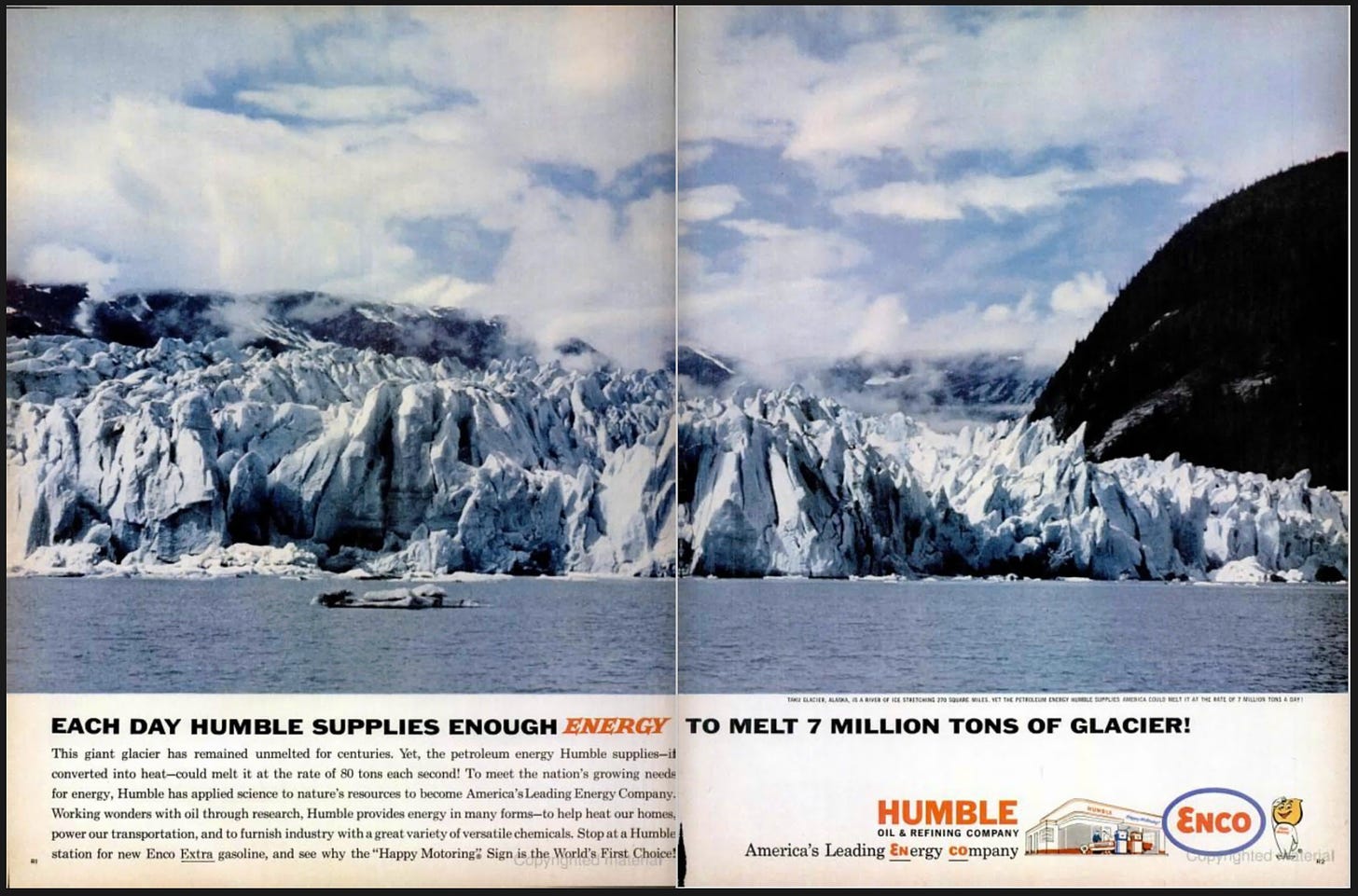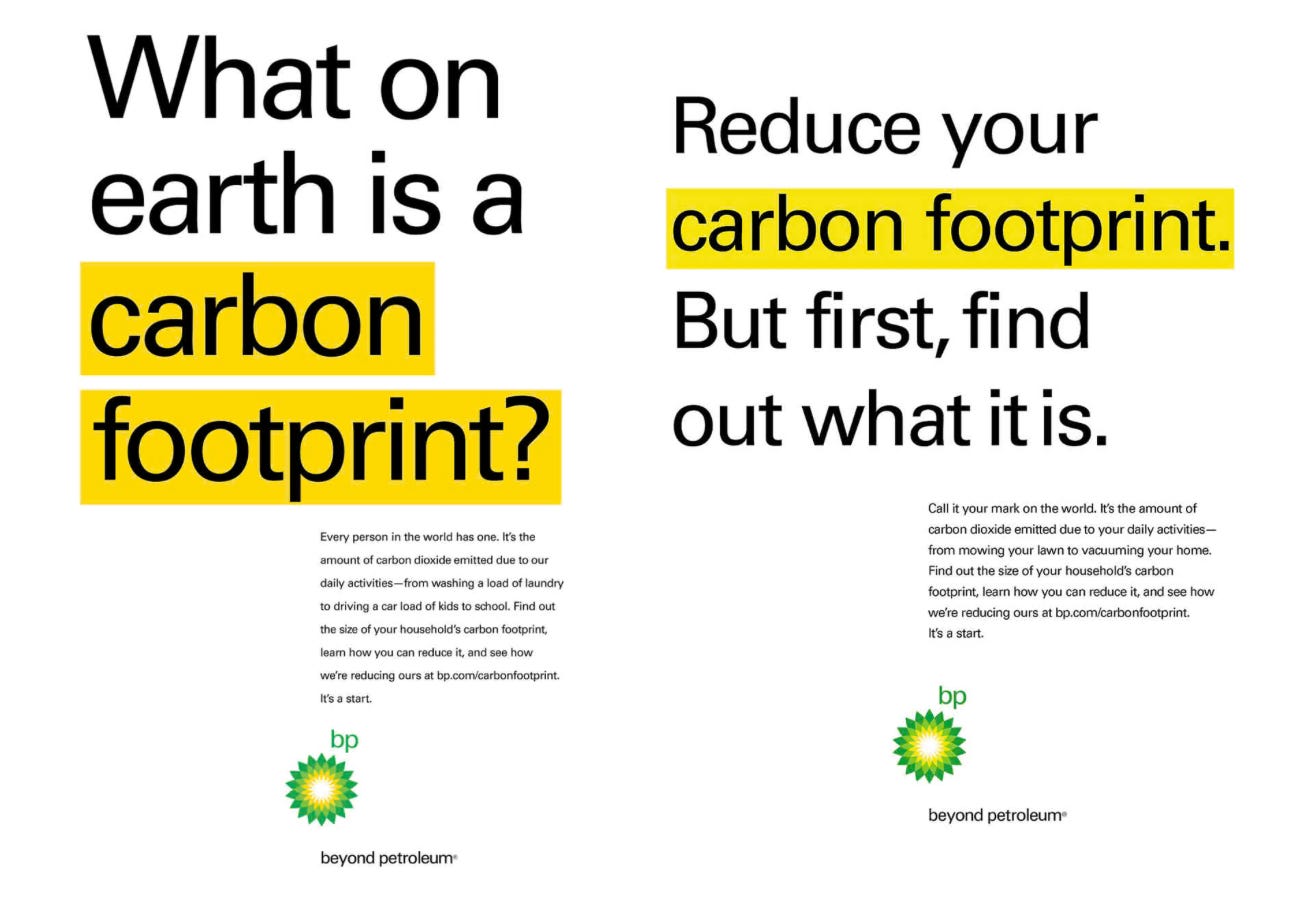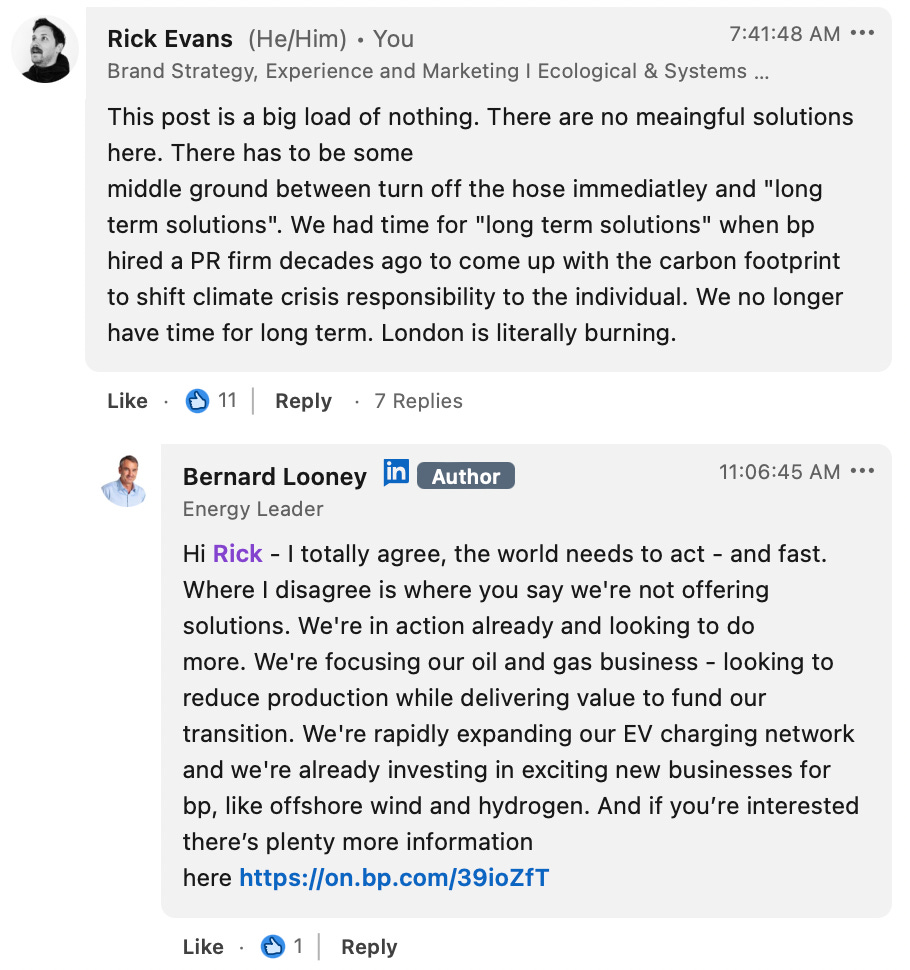
Discover more from Ecosystem Member
A Reality Check on the Extractive Industry
The oil and gas industry is only interested in preserving their own limited future, not securing our collective future.
About two years ago last month, my contract was terminated from my ‘dream job’ after just nine working days. You could say my dream job turned out to be a nightmare. (🤣….….😭)
I followed a beloved boss to a well-regarded ‘ideas and innovation’ agency. An agency, in fact, that had just launched a dedicated practice unit that claimed their primary client was Mother Earth.
A few days in, I was talking to a junior staffer who shared a brief from an extractive industry client. (A client that the agency had publicly promoted its work for in the past, but is not currently shouting about.) The brief was to create a digital app that would make it easy to track your carbon footprint.
Some folks may say that this sounds like progress. The oil and gas industry is trying to help people lower their impact.
Before you travel down that road, let’s take a quick look at the history of the carbon footprint and our relationship with fossil fuels.
The idea of an individual environmental footprint goes back to 1979, but the term carbon footprint wasn’t used until 1999 by the BBC’s ‘Vegetarian Good Food’ program.
Prior to 2004, the oil and gas industry engaged in outright climate change denialism and even in some cases, climate change celebration.
However, in 2004, advertising and public relations agency Ogilvy was hired to popularize the idea of a personal carbon footprint by oil giant bp. (Also known as British Petroleum and for a short while Beyond Petroleum, a rebrand worth an entire chapter in many greenwashing books.) From 2004 to 2006, Ogilvy supported bp’s mission to use the carbon footprint to shift responsibility. Instead of denying that climate change was happening (or celebrating it), they decided it was more prudent to make it your fault rather than theirs.
Of course, trillions of dollars have been invested in infrastructure and millions more on influencing politicians to make fossil fuels inescapable. And sure, oil giants knew what would happen as a result of increasing fossil fuel extraction and usage as far back as the 1970s. But it would no longer be their fault. It is yours for driving a gasoline-powered car to take your kids to school, or buying a rain jacket that was made with polyester derived from fossil fuels when that’s pretty much all that is on the shelf. The oil and gas industry would continue to rake in $7 trillion in subsidies globally from national and local governments in addition to record-breaking profits.
For many of you reading this, this story is not new. But, the story doesn’t end there.
The Democratic Party in the United States recently wrapped a three-year investigation into the oil and gas industry’s climate disinformation practices. Not only did they uncover clear evidence of misdirection in the past, but misdirection still occurring today.
While no longer focused on shifting responsibility, the new narrative around being ‘part of the solution’ is flimsy at best. The Democrats’ report found that two of the industry’s favorite ‘innovations’ - biofuels and carbon carbon - are not as effective as the industry likes to say they are when it comes to mitigating climate change. And they know it.
According to estimates by The Intergovernmental Panel on Climate Change, carbon capture could account for just a little over 2% of global carbon emissions reduction by 2030. And it is only really the best choice for the ‘hard to abate’ emissions where there are no or limited other options to reduce emissions. The oil and gas industry has been claiming the technology will be essential while internal documents show they don’t even believe their own public statements. (If you want to nerd out on the very costly and very limited effectiveness of carbon capture, check out the University of Pennsylvania’s Joe Romm.)
Biofuels on the other hand have been around for much longer, while proving similarly problematic. In many cases, biofuels are supported by governments as a way to keep farmers happy by using corn to create biofuel. However, biofuels often require more energy to produce an ethanol-based biofuel than what it delivers in fuel energy - it’s energy negative. Other biofuels use inputs like animal fats, which only serve to prop up an even more problematic industry in animal agriculture. (Animal agriculture itself accounts for 10 to 20% of global emissions and is a primary producer of the far more severe emission of methane.)
For my sins, I sometimes reply to people trying to push the fossil fuel industry’s narrative on LinkedIn. While many of these people are passengers taking advantage of the industry’s wealth to boost their own business, others are in the driver’s seat.
Shortly after my contract was terminated, I came across then bp CEO Bernard Looney’s post about a podcast series bp paid The New York Times to create. Bernard’s point was that people calling for bp to eliminate or reduce oil and gas extraction immediately were not considering the complexity of the challenge. And that if they did cease extraction, someone else would surely fill the gap.
One of the industry’s favorite lines is that ‘it’s not that simple.” There’s no way we could stop extraction of fossil fuels, or the economy would crumble. And they are correct, the oil and gas industry - with our consent or make accurately mis- or ill-informed consent - essentially built - by hook or crook - an economy that won’t function without fossil fuels (at least for right now). They say we need to focus on transition and the future without being clear on exactly how they will transition in effective, climate-positive manner.
Despite this focus on transition and the future, in the two years since Bernard’s LinkedIn reply, bp has seemingly increased investment in fossil fuel production and reduced investment in a lower carbon transition. Looney resigned in September 2023 and received no severance on account of his ‘serious miscounduct’.
The oil and gas industry is not our friend. They are more like a drug dealer whose seemingly low-cost product got us hooked. It will now be expensive but necessary to come clean. And we can do it.
So on top of some other problematic clients (including the world’s largest plastic polluter), I told my boss at the ‘ideas and innovation agency’ that I couldn’t work on these clients. I reiterated my very deeply held and very publicly shared environmental beliefs. A few days later I was let go with no official reason provided and like my good friend Bernard, with no severance package.
Three Things
Clean Creatives / Creatives for Climate - I am not the only one saying no to working for the extractive industry. Thousands of individual creatives, strategists and account folks, along with entire agencies are kicking the fossil fuel drug.
Drilled - The Vox article about the Democrat’s investigation that I referenced above was researched and written by Amy Westervelt. She is the Executive Editor for Drilled, in addition to being a reporter and writer for the site as well as outlets like The Guardian and The Washington Post. Pretty much everything she writes is a must-read.
Carbon Credits - The world of carbon credits is a bit of a mixed bag. The latest research from the Science Based Targets Initiative found that “various types of carbon credits are ineffective in delivering their intended mitigation outcomes.” It’s no surprise that big oil like bp have backed another ‘climate solution’ that isn’t much of a solution.
Subscribe to Ecosystem Member
What does it mean to be a member of an ecosystem? A podcast and newsletter exploring our relationship with the more than human world.








